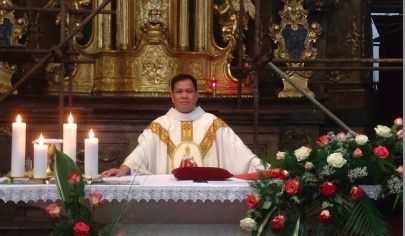Extrajudicial killings (EJKs) amid President Duterte’s unrelenting war on drugs and the government’s prodeath penalty stance were among the issues expected to be tackled by Philippine Catholic bishops as a plenary assembly began on Saturday.
Questions about the church’s relevance in an increasingly modern, interconnected world were also expected to be raised and discussed in the three-day gathering, officials said.
Fr. Jerome Secillano, executive director of the Catholic Bishops’ Conference of the Philippines’ (CBCP) public affairs committee, said these issues would be discussed even as it remained unclear whether a pastoral letter would be issued at the end of the gathering.
“Sociopolitical issues include the war on drugs, extrajudicial killings, death penalty, federalism,” Secillano said, adding that other topics also expected to be taken up include social media abuse, including the presence of “trolls.”
“I’m not sure if they will issue a pastoral letter, but it may be possible in light of present circumstances,” he said.
Leaders of the usually combative and politically influential Catholic Church, credited for helping topple two Presidents, have been largely silent on the killings, even as individual parishes have been highly critical.
The number of those killed have gone past the 7,000 mark since President Duterte took power, rights groups said. The police, however, have downplayed the claim, and say that only some 2,500 suspected drug addicts and pushers have been killed, while the rest were considered “deaths under investigation,” a euphemism for those killed by suspected vigilantes.
Of late, President Duterte has increased his tirades against the church, cursing some bishops and accusing them of corruption.
Crossroads
CBCP head and Lingayen-Dagupan Archbishop Socrates Villegas on Saturday said “rapid changes” in society have led to the church at a crossroads. He questioned “liturgical pageantry” and wondered whether they were relevant in today’s evolving world, with the young spending most of their time online.
“We issue pastoral letters but are we still understood and relevant to the struggles and visions of our people? Can we listen to gutter language without judgment?” he asked. “Are we not becoming shell institutions—lovely to see with nothing inside?”
Villegas stressed that young Catholics “seek Pokemon in our parish churches and accidentally find God while window shopping.” Unconventional Masses at noon and late at night have also become popular because of the young who work as call center agents.
“Are we ready to ride on Facebook as our pulpit to proclaim Christ to our young generation?” he asked, noting that Masses have also been increasingly held in malls.
He said these “transitions” needed the church’s attention and direction, which he hoped the bishops could provide during the plenary assembly, the highest decision-making body of the CBCP.
“The shifts in paradigms need shifts in our pastoral approaches,” Villegas said. “A defensive church will not inspire and ignite souls.”
The plenary assembly at Pope Pius XII Catholic Center in Manila began on Saturday, the second to the last for Villegas as CBCP president.
He will relinquish his post by December after completing his second two-year term in office.
According to the CBCP, 82 out of the 91 active bishops, and nine of the 41 honorary CBCP members were attending the plenary assembly, which provides policy directions for the church.
Villegas, in his opening message, said the church has become inadequate to the tasks it should perform, making it a “shell institution” that is sometimes seen as disconnected to what is happening in reality.
He told fellow bishops to inspire Catholics, because “a defensive Church will not inspire and ignite souls.”
He acknowledged rapid changes happening in Philippine society, something that he said the church needs to acknowledge so that it may better answer the needs of Filipinos.
“We can be victims of change, but we can be its authors as well as its guardians. Pope Francis is providing us, pastors, with a sterling example of what it is to respond and at the same time to lead, to change boldly, but to hold to what is true faithfully as well,” he pointed out.
Lawyer Maria Concepcion Noche who challenged the country’s reproductive health law was awarded by the CBCP the Bishop Jeorge Barlin Golden Cross Award.
Noche was recognized for her “steadfast defense of the Catholic teachings and Filipino values, in particular with the rights of every Filipino from conception to natural death.”


